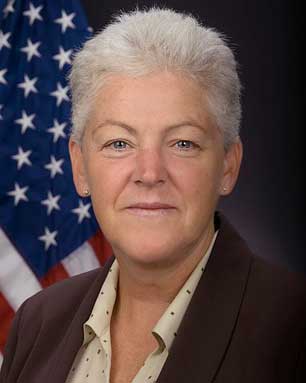Since Lisa Jackson announced that she would resign her post as administrator of the U.S. Environmental Protection Agency, environmental advocates have anxiously awaited news of who would take her place. On Monday, the suspense came to an end as President Barack Obama announced his official nomination: Gina McCarthy, the assistant administrator for EPA’s Office of Air and Radiation and a known champion for public health.
While Jackson tried her best during a time of unprecedented obstruction, many were disappointed with her overall accomplishments as EPA chief. Few of us will ever forget her brazen testimony to Congress that “there’s no proof fracking is dangerous.” Those who place a priority on environmental health and resource conservation have plenty of reason to believe that McCarthy will be a more productive leader.
Wondering about McCarthy’s pedigree and why enviros are so excited to see her head up the EPA? Here are three things you should know:
1. She’s got experience. McCarthy previously served as the assistant administrator of the EPA’s Office of Air and Radiation. The office develops policies and regulations for limiting air pollution and radiation exposure. In this position, McCarthy helped implement new or improved national standards for pollutants such as mercury, sulfur and nitrogen oxide emissions, and soot, and she oversaw the first-ever limits on greenhouse gas emissions from new power plants.
2. She knows how to work with Republicans. McCarthy served as an environmental policy adviser to Governor Mitt Romney in Massachusetts, and she helped launch the state’s Climate Protection Action Plan. Starting in 2004, she was head of Connecticut’s Department of Environmental Protection under Governor Jodi Rell, where she coordinated the state’s involvement in the Regional Greenhouse Gas Initiative, a regional program to limit global warming pollution from power plants. “McCarthy’s stellar work under two Republican governors as well as her excellent work over the past four years at the EPA is proof that when it comes to protecting our health and environment, it isn’t about who you work for or what party you represent,” said Margie Alt, executive director for Environment America. “It’s about whether you can get the job done. And Gina McCarthy can get the job done.”
3. She likes science. “Many environmentalists see her pragmatism and reliance on a science-based standard as a good way to broker potential deals with those that oppose the EPA’s agenda,” writes Morgana Matus for Inhabitat. “Delivering speeches without a prompter and with a sharp sense of humor, McCarthy has been known to win over skeptics with her blunt, personable style.” She’s also got a lot of experience dealing with industry, especially those prone to big pollution, putting her in a unique position to demonstrate that the arguments for economic security and environmental protection are really two sides of the same coin.
Currently, there are no immediate signs of an industry-backed groundswell to derail McCarthy’s confirmation. Leading advocates for the petroleum, mining and coal-fired power industries issued restrained statements either congratulating her or praising her for working with them on past regulations, reports Politico.
Trump is silencing political dissent. We appeal for your support.
Progressive nonprofits are the latest target caught in Trump’s crosshairs. With the aim of eliminating political opposition, Trump and his sycophants are working to curb government funding, constrain private foundations, and even cut tax-exempt status from organizations he dislikes.
We’re concerned, because Truthout is not immune to such bad-faith attacks.
We can only resist Trump’s attacks by cultivating a strong base of support. The right-wing mediasphere is funded comfortably by billionaire owners and venture capitalist philanthropists. At Truthout, we have you.
Truthout has launched a fundraiser, and we have only 24 hours left to raise $15,000. Please take a meaningful action in the fight against authoritarianism: make a one-time or monthly donation to Truthout. If you have the means, please dig deep.
